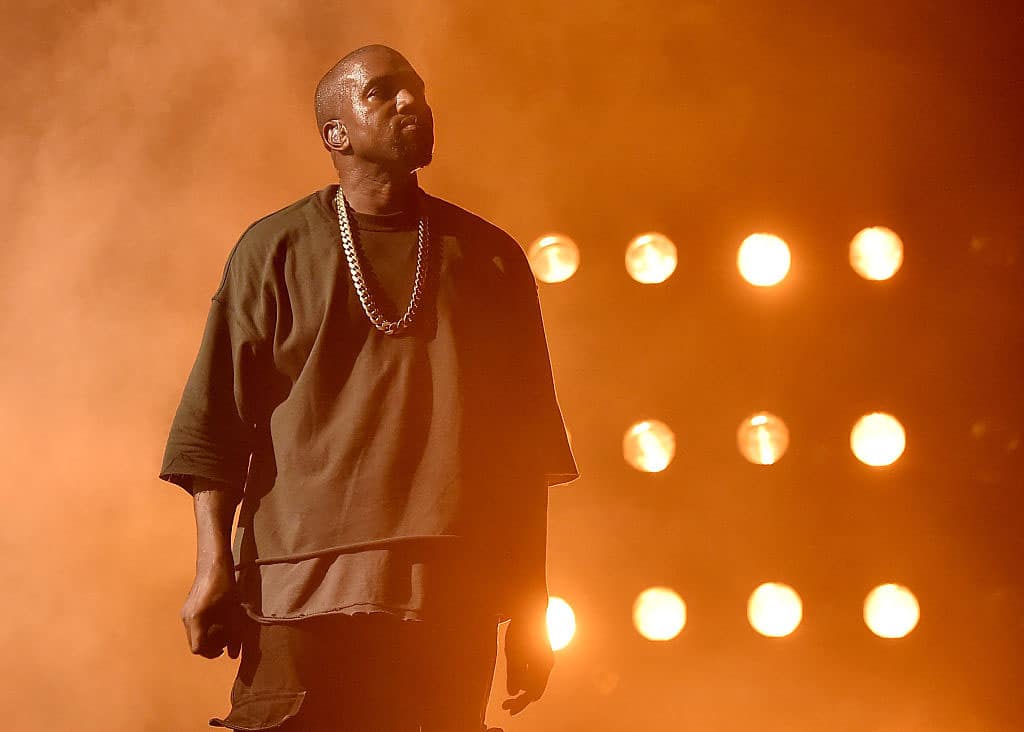 (Photo by Kevin Winter/Getty Images for iHeartMedia)
(Photo by Kevin Winter/Getty Images for iHeartMedia) Celebrities led by American rapper Ye (formerly known as Kanye West) and social media giants were responsible for promoting a highly public wave of antisemitism in 2022, the Simon Wiesenthal Center (SWC) said Thursday as it published its Top 10 worst antisemitic incidents over the past 12 months.
Global stars with millions of followers posted age-old anti-Jewish tropes on social medial platforms such as Twitter, Facebook and Instagram, the organization found, even as those platforms failed to tackle the problem effectively. It listed “The Influencers” as the first of its top 10.
SWC, a human rights organization that exposes and combats antisemitism around the world, announced its findings at a press conference held by Rabbi Abraham Cooper, its associate dean and director of Global Social Action, at the Jerusalem Press Club. The organization singled out Ye for his repeated antisemitic comments and his freely expressed praise for Hitler.
Ye’s comments were “parroting Louis Farrakhan,” Cooper said Thursday, echoing the SWC round-up, which branded Nation of Islam leader Farrakhan as “America’s godfather of hate” who is responsible for keeping “anti-Semitic screeds … afloat for decades.”
The rapper “used his unparalleled social media influence to morph these historic tropes into a firestorm of real-time anti-Semitism – absorbed by millions, and inspiring acts of hate against Jews living and dead,” the organization said.
Speaking to The Media Line after the press conference, Cooper branded West “an accelerant” of antisemitism. “The man had access to over 50 million people when he snapped and started his still-continuing tsunami of hate against the Jewish people,” he said.
“What the white supremacists did … is they pre-positioned themselves on Twitter before Kanye West, [which is] something that just happened a few weeks ago,” he said.
“It was already a horrible year in antisemitism, but they were ready for someone like a Kanye West to come, and they were so fast to take advantage of it, that they’re now marketing sweatshirts with swastikas and Stars of David with the swastika embedded in there.”
Cooper told The Media Line that Ye’s comments were “only a dream for someone like Farrakhan, who basically wrote these talking points [such as] Hitler was great, unleashing extremist groups within the African-American community.”
The rabbi said during the press conference that “the monetizing of antisemitism,” was one of the greatest concerns. He showed images of clothing bearing the Star of David intertwined with the Nazi swastika.
The International Holocaust Remembrance Alliance (IHRA) definition of antisemitism, adopted by dozens of countries and organizations around the world, includes “drawing comparisons of contemporary Israeli policy to that of the Nazis.”
“We have to fight very hard to make sure [monetization] doesn’t become mainstream, so that someone’s going to get on a United Airlines flight wearing the swastika and say what’s wrong with that?” he said.
Cooper said at the press conference that the free availability of social media has been “a bonanza for extremists.”
Companies such as Facebook and Twitter must “throw these people back in the gutter,” the rabbi said. He pointed out, however, that those who are banned from social media migrate to Telegram, an instant messaging service where encrypted channels and comments are not moderated. Telegram appears as number 10 on the SWC list.
“Unfortunately, Telegram isn’t going anywhere,” Cooper told The Media Line. He said that while “we have a chance at pushing… the social media companies to change and upgrade the way in which they deal with the extremists,” such an opportunity does not exist with the unmonitored messaging platform.
“Right now, I see Telegram as an open-ended sewer that we’re going to have to be dealing with for a long time to come,” he said.
The center also highlighted former US President Donald Trump’s meeting with Ye and white nationalist Nick Fuentes at the former president’s Florida golf resort Mar-a-Lago in November. Trump obfuscated about this meeting, SWC said, and “failed to condemn Fuentes or fully explain why he met with Kanye West who was running amok with anti-Semitic vitriol, until he was pushed to do so by his former vice president, Mike Pence, and others.”
But by then, SWC wrote in its report, “the damage had been done.”
Other political entities also came under fire Thursday, with the United Nations Human Rights Council appearing as second on the SWC list. The entry mentioned in particular Italian lawyer Francesca Albanese, who was earlier this year named as the UN’s Special Rapporteur on the Situation of Human Rights in the Palestinian Territories and who was forced to apologize for tweets containing slurs against Jewish people.
SWC branded Albanese as “a walking anti-Israel encyclopedia,” who engaged in “anti-Semitic screeds,” including claims that a “Jewish lobby” controls the United States.
The US Ambassador to the Human Rights Council Michele Taylor previously castigated Albanese for the comments, which she said were “outrageous, inappropriate, corrosive and degrades the value of the UN.”
Even so, SWC pointed out, “no action has been taken by the UN to sanction or remove Albanese from this sensitive post.”
“When it comes to antisemitism,” Cooper said Thursday, “there should be no politics.”
The rabbi also slammed American university campuses – number seven on the SWC list – which he said had become a hostile environment for Jewish students and academics alike.
“Today Zionism is a dirty word on most campuses in the US,” Cooper told reporters, referring to the Jewish people’s aspiration for a homeland. He cited “open attacks” and “aggressive” support on campuses for the Boycott, Divestment and Sanctions Movement against Israel.
“That’s why a definition for antisemitism is important,” Cooper said, referring to the IHRA definition that describes as antisemitic: “holding Jews collectively responsible for actions of the state of Israel,” “denying the Jewish people their right to self-determination” and “applying double standards by requiring of [Israel] a behavior not expected or demanded of any other democratic nation.”
Cooper also raised the attack at a synagogue in Colleyville, Texas on January 15, in which a British-Pakistani man armed with a gun took four people hostage during Shabbat services. SWC placed the incident at number five on its list, and said that there were many unanswered questions surrounding the attack, including who funded his travel from the UK to Texas, why he chose a synagogue and who was really behind the hate crime.
The rabbi said that the attack “shrieked terrorism,” and it had led SWC to ask FBI Director Christopher Wray to create a special task force on antisemitism. According to SWC, Wray himself acknowledged that 63% of all religion-based hate crimes in America targeted Jews, even though they only make up a little over 2% of the US population.
“What happened in Texas was an act of terrorism, not just a hate crime,” Cooper told The Media Line. “This is someone who came from thousands of miles away. Whether he was trained or not, there are so many open-ended questions about that particular incident that opens a whole another area of concern and fear for the Jewish community,” he said.
“So, what has transpired now in the United States [is that] there aren’t enough police, there’s not enough training, not enough money from the taxpayers,” Cooper concluded.
Dr. Abbee Corb, digital terrorism consultant for SWC, told The Media Line that the formation of networks and communities of hate are among the most concerning recent developments. Alongside this is the “cross-pollination of groups that are coming together in the online environment: keyboard cowboys are being emblazoned by each other, groups are coming together who might not normally have come together. But the community building, that to me is the most problematic thing and it is increasing tenfold. In the past year it has gone up dramatically; it’s very very scary, especially in the Telegram environment where everything is encrypted, some of the communities are members only. It’s a very scary development.”
Corb says that people who see such activity online should contact the SWC, or local law enforcement.
She also says that parents should be “active and proactive” and should be “knowledgeable” about what their kids are doing online. She urges parents to monitor their children’s online activity, and suggests that they use their laptop computers in a more public area such as the kitchen as opposed to in their bedrooms. And if parents see their children looking at hate material online, Corb recommends using it as a teachable moment: “Exploit the negative for a positive.”






















 More news and opinions than at a Shabbat dinner, right in your inbox.
More news and opinions than at a Shabbat dinner, right in your inbox.